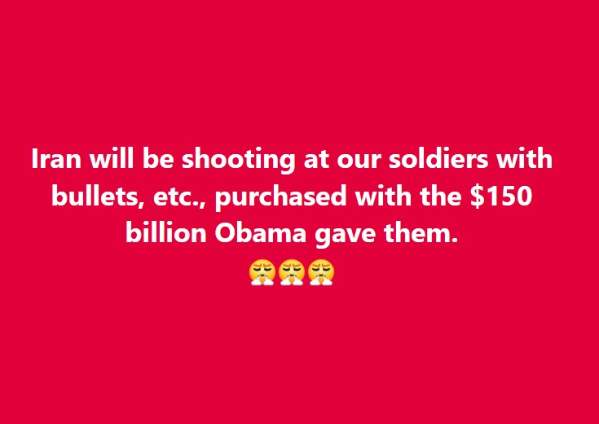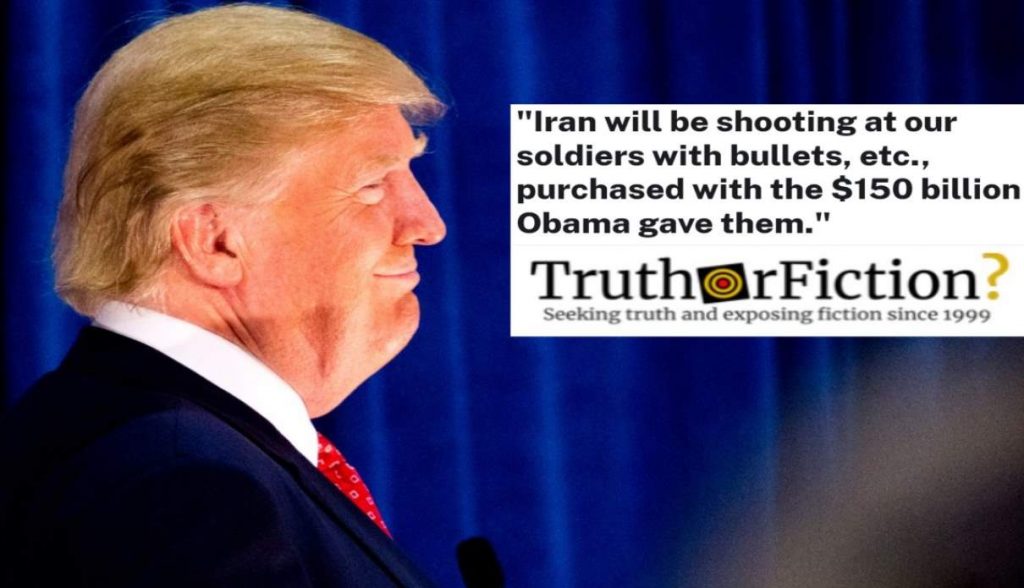Among his many attacks at then-United States President Barack Obama, Donald Trump took to spreading the fake claim that Obama was solely to blame for a multi-national treaty on nuclear arms involving Iran.
Trump claimed during an August 16 2015 appearance on the NBC show Meet The Press that Obama was not only circumventing Congress but handing Iran “$150 billion” and saying he would “police the contract” critically if elected president:
The problem is by the time I get in there, they will have already receive the $150 billion. Do you know if the deal gets rejected they still get the money? Which is something I found out a week ago. I couldn’t believe it. If the deal gets rejected, they still get all of this money. Iran is going to be unbelievably powerful and unbelievably rich.
Presenter Chuck Todd did not push back on Trump’s distortion of the plan, formally known as the Joint Comprehensive Plan of Action (JCPOA).
The agreement by the United States, Iran, and the European Union as well as China, France, Germany, Russia, and the United Kingdom, was finalized a about month before the broadcast; it called for Iran to reduce its supply of low-enriched uranium by 97 percent and maintain that lower supply for 15 years.
In return, Iran would regain access to money raised through its sales of oil that had been frozen as part of international sanctions. As NPR reported at the time:
Month after month, millions of dollars of oil revenues were added to its ledgers. But Iran hasn’t been able to get its hands on that cash. It’s frozen in overseas banks.
“The money is sitting in China, India, Japan, South Korea, Turkey, maybe a little bit in Taiwan,” says Mark Dubowitz, the executive director of the Foundation for Defense of Democracies. “Those countries were buyers of Iranian oil.”
Estimates for how much money Iran could recover placed the amount of money the nation would actually recoup at $56 billion, given that they also had outstanding loans to other countries at the time. In other words, Obama was not going to “give them 150 billion.” But in a now-familiar story, Trump’s lie was allowed to spread online in perpetuity:

Trump maintained the lie even after being elected U.S. president in November 2016 and withdrawing the U.S. from the agreement in May 2018, continuing to claim that “Democrats and President Obama gave Iran 150 Billion Dollars and got nothing”:
The lie even outlived Trump’s own now-disgraced administration; the Washington Post reported in September 2021 that Mike Pompeo, Trump’s former Secretary of State, pushed what they referred to as the “zombie claim” on televised interviews.
Similar distortions have resurfaced online in response to a September 2023 prisoner exchange between Iran and the U.S. that involved the release of $6 billion in Iranian funds that had been held in South Korea; predictably, Trump (baselessly) accused U.S. President Joe Biden’s administration of corruption.
But a report from the Washington Institute for Near East Policy rebuked the disgraced former president, noting that not only did Trump’s administration fail to make such an agreement in its own right, the 2023 exchange is far from unprecedented:
Washington has a long history of pairing the transfer of Iranian funds with Tehran’s release of hostages, including in 1981, 1991, and 2016, with the implementation of the nuclear deal. In each case, the United States reached financial settlements with Iran related to disputes originating with the 1979 Islamic Revolution, which were directly or indirectly connected with the release of Americans held hostage in Iran or Lebanon. In several instances, hostages were freed during the Trump administration without the release of Iranian funds.
The South Korea funds are different. Instead of money linked to forty-year-old disputes, these funds were payment for more recent South Korean purchases of Iranian energy products, primarily condensate, and have sat idle in two South Korean banks. In theory, Iran should have been able to use that money for humanitarian purchases. But in practice, the money was inaccessible because the Korean government and banks were concerned about falling afoul of U.S. sanctions.
The group also concluded that “claims that Iran would commit all of these resources toward nefarious purposes are likely exaggerated.”
The exchange was announced the same month that Trump gave another interview to Meet The Press, which earned new presenter Kristen Welker criticism for failing to contain Trump’s lies — even though the interview was taped prior to broadcast.
Update 9/19/2023, 2:01 a.m. PST: This article has been revamped and updated. You can review the original here. — ag
- Meet the Press Transcript - August 16, 2015
- U.S. Department of State - Joint Comprehensive Plan of Action
- Lifting Sanctions Will Release $100 Billion To Iran. Then What?
- "Iran Will be Shooting at our Soldiers with Bullets, etc., Purchased with the $150 Billion Obama Gave Them."
- The Historic Deal That Will Prevent Iran from Acquiring a Nuclear Weapon
- Pompeo Repeats 'Zombie' Claim that Obama Gave Iran $150 Billion
- Trump Declares US Leaving 'Horrible' Iran Nuclear Accord
- Iran Prisoner Swap: US Citizens Freed in $6bn Deal
- Trump Accuses Biden of Taking 'Kickback' in $6bn Iran Deal
- The Iran Hostage Deal: Clarifying the $6 Billion Transfer
- Kristen Welker Criticized for Lie-Filled Trump Interview in 'Meet the Press' Debut: 'Horrible Way to Start Her Tenure' (Video)
- The Mainstream Media Still Hasn’t Learned Anything About Covering Donald Trump

